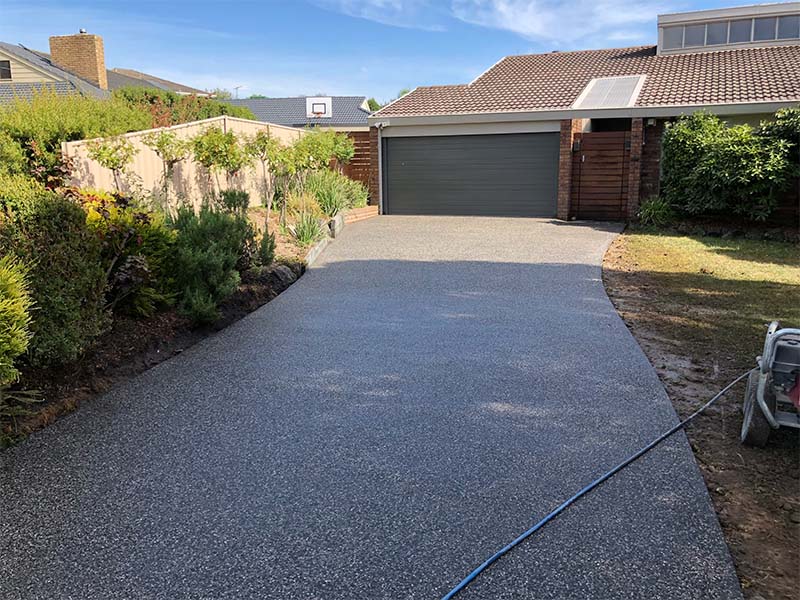When it comes to picking the proper material for your Melbourne driveway, two popular choices are asphalt and concrete. Each has a distinct set of advantages and disadvantages, and being aware of these can help you make the right choice. We’ll review the main distinctions between asphalt and concrete driveways in this guide, particularly considering elements like price, longevity, upkeep, and visual appeal.
Keep reading until you know the difference between concrete and asphalt driveway in Melbourne.
Asphalt Driveways: Adaptable and Economical
Asphalt is a popular choice for driveways due to its strength and cost. Let’s examine its benefits and drawbacks.
Benefits
Cost-Effective:
The low cost of asphalt is one of its main advantages. It is an excellent alternative for people on a low budget because it is typically less expensive to install than concrete.
Quick Installations:
Asphalt driveways can be installed quickly—much faster than concrete—and are then ready for use. This quick installation will cause less inconvenience to your routine.
Flexibility:
Because of its flexibility, asphalt can withstand ground changes that can cause cracks, a prevalent problem in Melbourne’s unpredictable climate.
Winter-Friendly:
During Melbourne’s colder months, asphalt’s ability to absorb heat helps to melt snow and ice more quickly.
Simple Repair:
Applying an Asphalt in Melbourne is a quick and easy DIY method that only takes beginner-level skills.
Drawbacks
Reduced Lifespan:
Compared to concrete, an asphalt driveway usually lasts 20 years.
More Maintenance:
Sealing is required within six months of installation and every three to five years afterwards to maintain its look and longevity.
Heat Sensitive:
Asphalt may become soft and sticky during Melbourne’s scorching summers in scorching weather.
Concrete Driveways:
Concrete is renowned for its strength and range of design possibilities. It does, however, also present a unique set of difficulties.
Benefits
Long-Lasting:
Compared to asphalt driveways, a well-maintained concrete driveway can endure up to 30 years or more.
Low Maintenance:
Concrete doesn’t need to be resealed as often as asphalt does. Generally, a little periodic sealing and cleaning every few years is sufficient.
Design Flexibility:
You can add distinctive and eye-catching patterns to concrete by stamping, engraving, and colouring it, enhancing your house’s visual appeal.
Better Load Bearing:
Concrete is better for homes with larger cars or frequent traffic because it can withstand heavier weights.
Drawbacks
Higher Initial Cost:
Installing a concrete driveway is more expensive than asphalt. This might be a big deal for homeowners who are trying to stick to a tight budget. Even the cost of hiring concrete driveway contractors can make up for the total expense.
Extended Curing Period:
Concrete requires more time to cure, extending the time you have to wait to use your new driveway.
Prone to Cracking With Time:
Concrete has a cracking potential despite its durability because of soil movement and freezing and melting cycles. Reliable concrete driveway contractors, however, can provide tips to maintain your driveway for years after installation. Repairs using asphalt can be more intricate and costly.
Stains and Marks:
Compared to asphalt, which may need more frequent cleaning, concrete is more prone to stains and tire marks.
The performance and quality of concrete driveways largely depend on efficient installation. This is where hiring skilled concrete driveway contractors in Melbourne becomes valuable.
A Comparison Between Concrete and Asphalt Driveways
Here is a brief comparison of the materials to help you choose between asphalt and concrete.
-
Cost:
Asphalt is typically more affordable for installation and maintenance expenses.
-
Faster Installation:
Asphalt driveways are faster to install and ready for use than concrete driveways.
-
Durability:
Concrete can support larger loads and generally has a longer lifespan.
-
Maintenance:
While concrete takes less upkeep but is more difficult to fix if damaged, asphalt needs more frequent attention.
-
Aesthetic Appeal:
Concrete has additional options for colour and design customisation.
Takeaway
In conclusion, choosing between asphalt and concrete for a new driveway is essential to improve your Melbourne property’s functioning and curb appeal. Concrete has greater longevity and design variety, while asphalt in Melbourne is more affordable and more accessible to install. Each material has advantages and disadvantages of its own.
Remember that the installation’s quality is just as crucial as the quality of the materials when comparing your alternatives between concrete and asphalt.
Expert asphalt and concrete driveway installers in Melbourne can provide priceless advice, from choosing the best material for your particular requirements to a faultless installation.
Choosing the Right Contractor is the Key
Choose Roadseal Civil as they make sure your driveway is beautiful to look at, solid and long-lasting, and able to endure Melbourne’s particular environment and your needs as a lifestyle.
Based in Melbourne, Australia, Roadseal Civil is a top concrete and asphalt solutions supplier. The company, which specialises in residential and commercial projects, is greatly satisfied with giving exceptional results.
Roadseal Civil has been in the business for over 20 years and provides many services, including driveway construction, road repairs, and parking lot surfaces. Their group of experts uses modern equipment and environmentally friendly methods with a dedication to excellence.
In Melbourne, Roadseal Civil is the first choice for excellent paving and civil construction services because of its reputation for dependability, customer-focused attitude, and thorough attention to detail.
